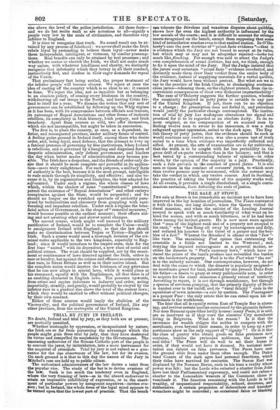TRIAL BY JURY IN IRELAND.
No doubt, Ireland and trial by jury, as they both are at present, are mutually unsuited. Whether naistaught by oppression, or incapacitated by nature, the Irish are so far from perceiving the advantage which the people might gain from trial by jury, that they have destroyed its virtue and compelled its suspension by the Government. The unceasing endeavour of the Roman Catholic part of the people is to convert the juror, by intimidation, into a mere instrument for the acquittal of criminals. Trial by jury is not valued as a gua- rantee for the due observance of the law, but for its evasion.
On such ground is it that to this day the names of the Jury in - Mitchel's case are held up to public odium. The authorized administrators of the law derive a taint from
the popular vice. The study of the bar is to devise evasions of the law. Such is too much the tendency even in England, where the very framing of laws—as in the absurd endeavour to -attain an impossible infallibility of expression, or in the enact- ment of particular powers by antagonist negatives—invites eva- sion ; but in Ireland, the whole force of the legal mind appears to be turned upon that the lowest part of practice. That the bench can tolerate the frivolous and vexatious disputes about quibbles, shows how far even the highest authority is influenced by the low morale of the courts; and it is difficult to account for strange tenets recognized on the bench, except from supposing that some kind of intimidation reaches even to that exalted station. In O'Do- herty's case the new doctrine of" prima facie evidence "—that it is evidence which the Jury are not bound to accept at its value, but which may or may not be altogether rejected—looks too much like flinching. For enough was said to attest the Judge's own comprehension of sound doctrine, but not, we think, enough to fix it upon the mind of the Jury. Had the Judge insisted that the jurors must entertain "prima. facie" evidence unrebutted, and distinctly made them draw their verdict from the entire body of the evidence, instead of supplying materials for a verbal quibble, the Jury would have been without pretext. But what are we to say to the practice of the Irish Courts, in discharging contunaa. cious juries—releasing them, on the slightest pretext, from the in- convenient consequences of their own dishonest impracticability?
The case of O'Doherty suggests the further question, whether the unanimity required in petty juries is suitable to any part of the United Kingdom. If not, there can be no objection to a change ; for prescription does not forbid it, and precedent
would of the particular change contemplated. The institu- tion of trial by jury has undergone alterations too signal and practical for it to be regarded as an absolute fixity. In its re- mote original, as the compurgation of an accused man by finding twelve men to swear to his innocence, it was a rude safeguard against oppression, suited to the dark ages. The Eng lish theory of petty juries, that the evidence should be such as would convince any twelve men, was also a coarse test of truth suited to a time when evidence was imperfectly collected and sifted. At present, the arts of examination are so far cultivated, that the truth is to be sought with far less probability in the gross drift of ex-parte evidence than in the balance ; and that is best tested by a corresponding balance of opinion—in other words, by the opinion of the majority in a jury. Practically, such a rule prevails in the conduct of grand juries. It is also seen at times in the conduct of coroners' juries, to which more than twelve persons may be summoned, while the coroner may take the verdict in which any twelve concur. And in Scotland, the practice of taking the verdict of the majority works well. At all events, it prevents a single dunderhead, or a single contu- macious sectarian, from defeating the ends of justice.


























 Previous page
Previous page